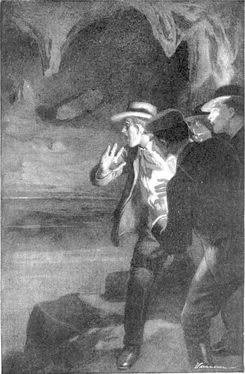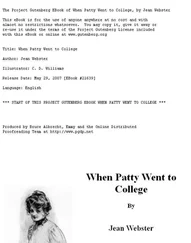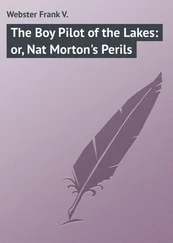Jean Webster - The Four-Pools Mystery
Здесь есть возможность читать онлайн «Jean Webster - The Four-Pools Mystery» весь текст электронной книги совершенно бесплатно (целиком полную версию без сокращений). В некоторых случаях можно слушать аудио, скачать через торрент в формате fb2 и присутствует краткое содержание. Жанр: Классический детектив, на английском языке. Описание произведения, (предисловие) а так же отзывы посетителей доступны на портале библиотеки ЛибКат.
- Название:The Four-Pools Mystery
- Автор:
- Жанр:
- Год:неизвестен
- ISBN:нет данных
- Рейтинг книги:3 / 5. Голосов: 1
-
Избранное:Добавить в избранное
- Отзывы:
-
Ваша оценка:
- 60
- 1
- 2
- 3
- 4
- 5
The Four-Pools Mystery: краткое содержание, описание и аннотация
Предлагаем к чтению аннотацию, описание, краткое содержание или предисловие (зависит от того, что написал сам автор книги «The Four-Pools Mystery»). Если вы не нашли необходимую информацию о книге — напишите в комментариях, мы постараемся отыскать её.
The Four-Pools Mystery — читать онлайн бесплатно полную книгу (весь текст) целиком
Ниже представлен текст книги, разбитый по страницам. Система сохранения места последней прочитанной страницы, позволяет с удобством читать онлайн бесплатно книгу «The Four-Pools Mystery», без необходимости каждый раз заново искать на чём Вы остановились. Поставьте закладку, и сможете в любой момент перейти на страницу, на которой закончили чтение.
Интервал:
Закладка:
THE FOUR-POOLS
MYSTERY
By
JEAN WEBSTER
NEW YORK
THE CENTURY CO.
1908
Copyright, 1907, 1908, by
The Century Co.
Published, March, 1908
THE DE VINNE PRESS

In the Cave
CONTENTS
I Introducing Terry Patten
II I Arrive at Four-Pools Plantation
III I Make the Acquaintance of the Ha'nt
IV The Ha'nt Grows Mysterious
V Cat-Eye Mose Creates a Sensation
VI We Send for a Detective
VII We Send Him Back Again
VIII The Robbery Remains a Mystery
IX The Expedition to Luray
X The Tragedy of the Cave
XI The Sheriff Visits Four-Pools
XII I Make a Promise to Polly
XIII The Inquest
XIV The Jury's Verdict
XV False Clues
XVI Terry Comes
XVII We Search the Abandoned Cabins
XVIII Terry Arrives at a Conclusion
XIX Terry Finds the Bonds
XX Polly Makes a Confession
XXI Mr. Terence Kirkwood Patten of New York
XXII The Discovery of Cat-Eye Mose
XXIII Mose Tells His Story
XXIV Polly Makes a Proposal
THE FOUR-POOLS
MYSTERY
CHAPTER I
INTRODUCING TERRY PATTEN
It was through the Patterson-Pratt forgery case that I first made the acquaintance of Terry Patten, and at the time I should have been more than willing to forego the pleasure.
Our firm rarely dealt with criminal cases, but the Patterson family were long standing clients, and they naturally turned to us when the trouble came. Ordinarily, so important a matter would have been put in the hands of one of the older men, but it happened that I was the one who had drawn up the will for Patterson Senior the night before his suicide, therefore the brunt of the work devolved upon me. The most unpleasant part of the whole affair was the notoriety. Could we have kept it from the papers, it would not have been so bad, but that was a physical impossibility; Terry Patten was on our track, and within a week he had brought down upon us every newspaper in New York.
The first I ever heard of Terry, a card was sent in bearing the inscription, "Mr. Terence K. Patten," and in the lower left-hand corner, "of the Post-Dispatch." I shuddered as I read it. The Post-Dispatch was at that time the yellowest of the yellow journals. While I was still shuddering, Terry walked in through the door the office boy had inadvertently left open.
He nodded a friendly good morning, helped himself to a chair, tossed his hat and gloves upon the table, crossed his legs comfortably, and looked me over. I returned the scrutiny with interest while I was mentally framing a polite formula for getting rid of him without giving rise to any ill feeling. I had no desire to annoy unnecessarily any of the Post-Dispatch's young men.
At first sight my caller did not strike me as unlike a dozen other reporters. His face was the face one feels he has a right to expect of a newspaper man—keen, alert, humorous; on the look-out for opportunities. But with a second glance I commenced to feel interested. I wondered where he had come from and what he had done in the past. His features were undeniably Irish; but that which chiefly awakened my curiosity, was his expression. It was not only wide-awake and intelligent; it was something more. "Knowing" one would say. It carried with it the mark of experience, the indelible stamp of the street. He was a man who has had no childhood, whose education commenced from the cradle.
I did not arrive at all of these conclusions at once, however, for he had finished his inspection before I had fairly started mine. Apparently he found me satisfactory. The smile which had been lurking about the corners of his mouth broadened to a grin, and I commenced wondering uncomfortably what there was funny about my appearance. Then suddenly he leaned forward and began talking in a quick, eager way, that required all my attention to keep abreast of him. After a short preamble in which he set forth his view of the Patterson-Pratt case—and a clearsighted view it was—he commenced asking questions. They were such amazingly impudent questions that they nearly took my breath away. But he asked them in a manner so engagingly innocent that I found myself answering them before I was aware of it. There was a confiding air of bonne camaraderie about the fellow which completely put one off one's guard.
At the end of fifteen minutes he was on the inside track of most of my affairs, and was giving me advice through a kindly desire to keep me from getting things in a mess. The situation would have struck me as ludicrous had I stopped to think of it; but it is a fact I have noted since, that, with Terry, one does not appreciate situations until it is too late.
When he had got from me as much information as I possessed, he shook hands cordially, said he was happy to have made my acquaintance, and would try to drop in again some day. After he had gone, and I had had time to review our conversation, I began to grow hot over the matter. I grew hotter still when I read his report in the paper the next morning. I could not understand why I had not kicked him out at first sight, and I sincerely hoped that he would drop in again, that I might avail myself of the opportunity.
He did drop in, and I received him with the utmost cordiality. There was something entirely disarming about Terry's impudence. And so it went. He continued to comment upon the case in the most sensational manner possible, and I railed against him and forgave him with unvarying regularity. In the end we came to be quite friendly over the affair. I found him diverting at a time when I was in need of diversion, though just what attraction he found in me, I have never been able to fathom. It was certainly not that he saw a future source of "stories," for he frankly regarded corporation law as a pursuit devoid of interest. Criminal law was the one branch of the profession for which he felt any respect.
We frequently had lunch together; or breakfast, in his case. His day commenced about noon and lasted till three in the morning. "Well, Terry, what's the news at the morgue today?" I would inquire as we settled ourselves at the table. And Terry would rattle off the details of the latest murder mystery with a cheerfully matter-of-fact air that would have been disgusting had it not been so funny.
It was at this time that I learned his history prior to the days of the Post-Dispatch. He was entirely frank about himself, and if one half of his stories were true, he has achieved some amazing adventures. I strongly suspected at times that the reporting instinct got ahead of the facts, and that he embroidered incidents as he went along.
His father, Terry Senior, had been an Irish politician of considerable ability and some prominence on the East River side of the city. The boy's early education had been picked up in the streets (his father had got the truant officer his position) and it was thorough. Later he had received a more theoretical training in the University of New York, but I think it was his early education which stuck by him longest, and which, in the end, was probably the more useful of the two. Armed with this equipment, it was inevitable that he should develop into a star reporter. Not only did he write his news in an entertaining form, but he first made the news he wrote about. When any sensational crime had been committed which puzzled the police, Terry had an annoying way of solving the mystery himself, and publishing the full particulars in the Post-Dispatch with the glory blatantly attributed to "our reporter." The paper was fully aware that Terence K. Patten was an acquisition to its staff. It had sent him on various commissions to various entertaining quarters of the globe, and in the course of his duty he had encountered experiences. One is forced to admit that he was not always fastidious as to the rôle he played. He had cruised about the Mediterranean as assistant cook on a millionaire's yacht, and had listened to secrets between meals. He had wandered about the country with a monkey and a hand-organ in search of a peddler he suspected of a crime. He had helped along a revolution in South America, and had gone up in a captive war balloon which had broken loose and floated off.
Читать дальшеИнтервал:
Закладка:
Похожие книги на «The Four-Pools Mystery»
Представляем Вашему вниманию похожие книги на «The Four-Pools Mystery» списком для выбора. Мы отобрали схожую по названию и смыслу литературу в надежде предоставить читателям больше вариантов отыскать новые, интересные, ещё непрочитанные произведения.
Обсуждение, отзывы о книге «The Four-Pools Mystery» и просто собственные мнения читателей. Оставьте ваши комментарии, напишите, что Вы думаете о произведении, его смысле или главных героях. Укажите что конкретно понравилось, а что нет, и почему Вы так считаете.












